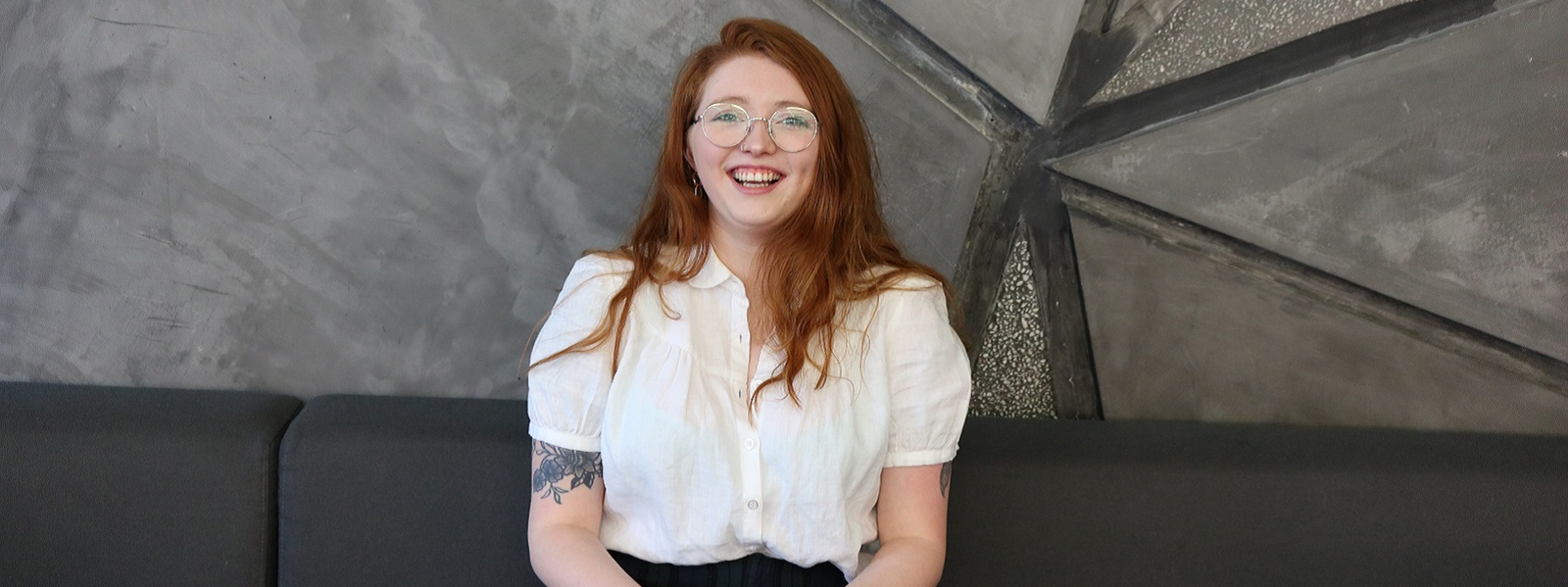Rebecca Johnson
MSc Research Methods in Psychology
Tell us a bit about your background…
Interestingly, I don’t really have a ‘home town’ as such. I was born in a really tiny and immensely boring town in England, very close to the military base my dad was situated at. I am a military child, which means I moved from several places in England, to Germany, to Cyprus and finally to Scotland. The amount of schools I had to move from is insane, I’d attended around 7 by the time I was 6. So my early childhood was pretty chaotic and I didn’t get to stay anywhere all that long. I was grateful to finally settle in Scotland but truly took about a year to understand the accent!
As if the moving wasn’t enough, my parents then decided to send me to military boarding school at age 10. That surprises a lot of people but also answers so many questions. The experience of military boarding school is pretty amazing. Everyone assumes it was very Harry Potter-esque. It was not. If you’ve ever seen that chick-flick Wild Child, it was like that but less posh. I did have to hand my phone in at nights and I had a bed time until I was 17, so the similarities are definitely there. Boarding school meant that I left home at aged 10. Which is why I was so eager to move to Glasgow as soon as I left.
What inspired you to study psychology?
When asked this question there are two real defining moments that spurred my foray into psychology. Firstly, I remember my very poor experience trying to discuss my mental health at age 15. I received little support, I had no knowledge on the subject and I didn’t understand what my emotions meant but I wanted to. That experience stayed with me, it shook me and led me to distrust my mind and my emotions. Following on from this, I later fell in love with biology. I loved being able to understand how the human body worked, how chemicals could explain behaviour. I started reading books and journal articles about the biology of the mind and behaviour. Before I even noticed, I was reading and studying psychology under the assumption it was biology. I then realised it was its own subject (my school didn’t offer it) and I knew it fit. I liked to help people, solve problems, understand the mind and I loved writing. Plus, it was the only subject ever that captivated my attention so completely (and nobody told me it had so much maths).
Why did you choose to continue studying (for your MSc) at the University of Strathclyde?
Truthfully, I was awful at statistics and quantitative research methods. Very quickly I learned that this was a very important part of psychology and the language of research. So I decided to not take the easy way out and dive head first into a research degree. Best decision I’ve ever made. Also, I stayed at Strathclyde because I felt my undergrad finished too soon. There was more I wanted to explore at Strathclyde. Plus, the staff are pretty ace.
What has been the highlight of your time at Strathclyde so far?
Difficult one. It’s a toss up between receiving the Erasmus summer internship or attaining a First Class Degree. I couldn’t quite believe I got the internship. I am the poster child for ‘just apply anyway, why not’ because that’s exactly what I did. Thankfully, my grades came out much better than expected and I realised I was actually pretty capable. Which is similar to attaining my degree, I had set very strongly on obtaining a 2:1, which wasn’t what I wanted but I truly believed I’d bombed the exams. Low and behold, a first class honours came through my email and I screamed in work. Both were nice because I didn’t expect them. Don’t get me wrong, I worked my sweet butt off for both of them. But it was always unexpected, I feel like my mind constantly undersells me to myself, which is why I entered the masters with a bit more self-belief.
What specialist knowledge/professional skills have you developed whilst studying the course?
So far in my postgraduate study, I have been given one of the Graduate Teaching Assistant positions. This has sharpened my academic judgement, time management and literacy. Especially because I have to mark essay’s alongside my coursework. Also, very specific to the MSc Research Methods degree, it has given me a strong understanding of research. I feel very capable to conduct, read, understand and even publish research of my own. I feel like a competent psychology graduate thanks to this degree. Lastly, it has pushed my time management to the absolute limit. I have had to maintain a level of organisation that I never encountered in my undergraduate. However, I am very thankful for the experience because it has made me a more goal orientated and focused academic.
What would be your advice for people considering taking this course?
You do not need to be a research genius and you do not need to be a statistics wizard. I definitely wasn’t. I promise you. What you do need to have is a passion for psychology and for furthering your studies or career. I would also suggest that you prep over the summer, refresh your general psychology research skills, like statistics. I spent most of my summer with a ‘psychology statistics for dummies’ textbook and it changed my life (for the better I promise, it would be a mistake to think that you are too smart for the for dummies textbook range, it is life changing for a statistics struggler). Hit the ground running, keep on top of everything and trust your gut.
What have been the main challenges studying at postgraduate level?
An easy list:
1. Time management.
2. The jump in marking and standards of work from undergraduate level.
3. The pressure to know what you’re doing next, where you are going.
4. Balance between study and life. This is difficult to find but it is so very important to focus on.
What do you think of the support available?
Truly, and I hope they don’t read this and develop an inflated ego, I think the Strathclyde psychology department boasts some of the most interesting, professional, supportive, passionate and dedicated staff I’ve ever worked with. Special shout out to my undergrad supervisor (Mark Elliot), MSc supervisor (Allan McGroarty, spelled it right) and Erasmus advisor (Kellyanne Findlay). All of these people have made my time at the university easier and better. They have also superbly put up with me and as you may have gathered, I talk a LOT. But as a whole, all of the staff are remarkable, truly a credit to the university.
What are your ambitions for the future?
The greatest thing I have taken from Strathclyde is that you need to be ambitious but you don’t need to know every step to be doing well. I hope to soon apply for the clinical psychology PhD at Glasgow University, however will take a year or so off to gain more experience. In the long run, I would like to work with young people potentially as a clinical psychologist. However, I am not set in stone. I am broadening my horizons with this degree, building my skill set and trusting my gut. For the most part, my ambition is to passionately pursue a career in psychology, to give to others what it has given to me. Clarity, a strong sense of self and a better understanding of who I am and what I can give to this world.

